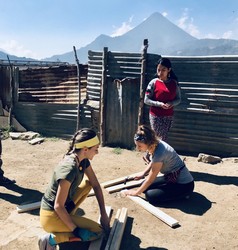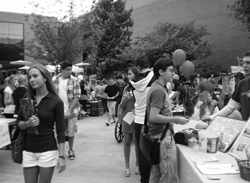When I stumbled across an email expounding the details of a course called Guatemala Public Health, taught by Chris Hirschler, Ph.D., I couldn’t help but be drawn to a class that would foster academic success while concurrently stimulating global understanding in a developing country.
I had no idea that this email would lead me to one of the greatest experiences that I have encountered.
For seven weeks, five other students and I prepared for our upcoming travels, reading articles and watching documentaries that would try to prepare us for what we would experience in Guatemala, not realizing that this could not fully prepare us for what we would eventually see, smell, hear, and feel with our own senses.
The curriculum educated us on impoverished conditions, the prevalence of violence, and taught us the history of the country, enabling us to understand the present.
Our class consisted of six students, as well as Ekaterina Bronshteyn, an adjunct instructor of music and theatre. Additionally, Jeffrey Wilhelms, a lecturer of sociology at Rutgers, joined us on our journey. Our group was welcomed with open arms by Archie and Jacky Contreras of A Better Life Foundation Guatemala.
Together, we constructed bunk beds, picked up trash within a cemetery located in Chichicastenango, assembled water filtration systems, hiked up the Picaya volcano, toured a private hospital, and met with Selaine d’Amborosi, a representative of a nonprofit animal welfare program, Ayuda.
During the three days spent in a domestic violence shelter for women, we created strong bonds despite cultural and language barriers. We shared universal sentiments: smiles, laughs, and hugs.
Students taught health and physical education-related lessons with the women, such as self-defense, healthy coping, painting to reduce stress, and several types of dances.
One shelter resident was so reserved and shy that upon our arrival the first day, she could not bare to look anybody in the eyes or introduce herself. It was heartwarming to see that by the last day of our visit, she took the dance floor alongside Bronshteyn, beaming for all to see.
Our group was fortunate enough to meet up with 18 year-old Marisol, who lives in Chichicastenango and has been sponsored by Hirschler for the past seven years. Marisol traveled with us throughout the duration of the trip, sharing her culture and language with us as we shared ours.
With approximately $800 that we were able to raise prior to the trip, we were able to buy groceries, clothing, and essential items that included sheets, pillows, blankets, a light source, and chairs for Marisol and other members of the community. One woman, Doña Rosa, was so incredibly overwhelmed by gratitude, she swelled with tears.
What stood out to me about Doña Rosa, was that despite being able to care for herself, her children, and her property without the essential resources, she rescued several dogs off the sides of streets and took them in as her own.
In Guatemala, their culture does not view animals, specifically dogs, in the way that we do. Dogs are found on every corner with no home or place to go.
It was truly unbelievable to watch Doña Rosa show such compassion while undergoing tremendous hardships.
“Doña Rosa is a woman worthy of admiration. She struggles to give her children a better life. This week, one of her dreams was fulfilled; her children were given a bunk bed so that they can rest better. In addition, they received a water filter system that will last 10 years, along with sheets, pillows and food thanks to the students at Monmouth University,” stated Contreras.
Nine days. Nine days spent absorbing a foreign culture. Nine days spent assembling friendships within our own group and within the communities we encountered. Nine days doing our best to help the community, knowing that our short stay might allow their daily lives to be just a little bit easier.
“This is an experience of a lifetime. We are welcomed into the homes and hearts of individuals who display incredible resilience and gratitude. They have enormous financial challenges, but they have a wealth of love and a strong sense of community,” said Hirschler.
“We are not ‘saving’ anyone, but we connect in a meaningful and loving way, and provide some assistance that can lead to some magical results,” Hirschler added.
If you are interested in traveling, indulging in a new culture, providing assistance to those of the community, all while having the learning experience of a lifetime, consider enrolling yourself in Guatemala Public Health next spring.
PHOTO COURTESY of Alexa LaVere




